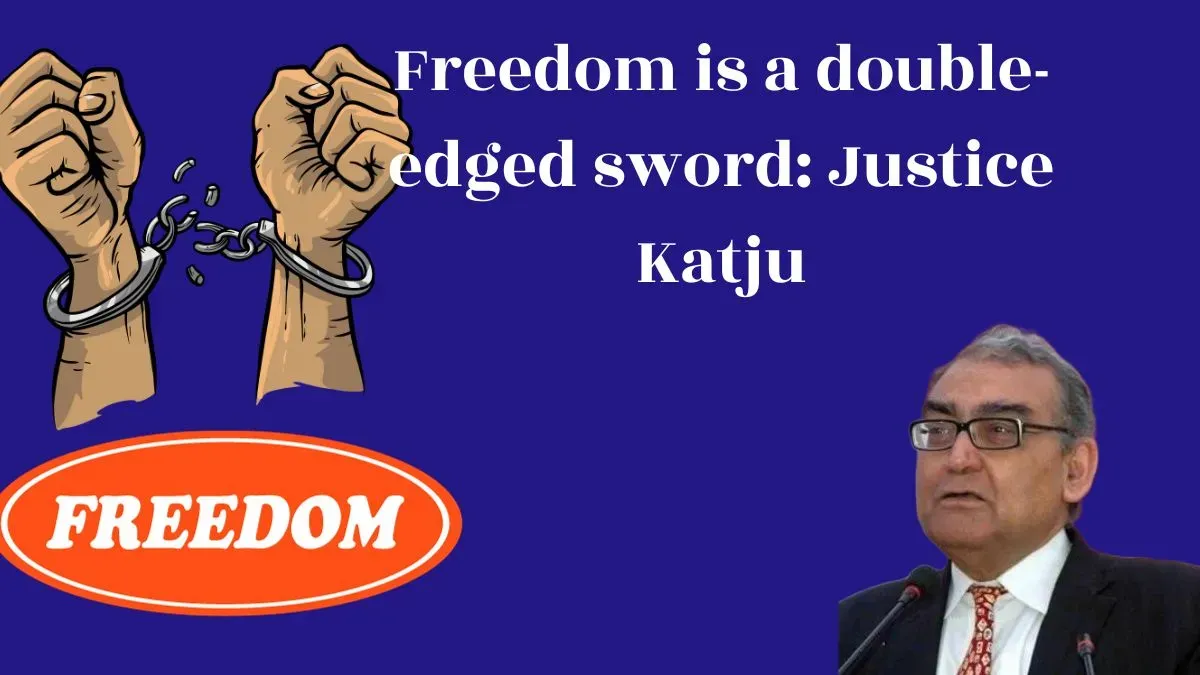Freedom is a double-edged sword
 |
| Freedom is a double-edged sword |
By Justice Markandey Katju
I have always condemned suppression of freedom in India, Pakistan, and elsewhere. But I have also said that too much freedom is also bad. This may sound a contradiction, so let me explain.
Freedom cannot be an end in itself, it can only be a means to an end, and that end must be raising the standard of living of the people, and giving them better lives. Real freedom is possible only with abolition of poverty, unemployment, hunger, lack of proper healthcare, lack of good education etc. What use is freedom of speech, liberty, etc to a man who is poor, hungry and unemployed?
I have said that this end cannot be achieved within the present system of parliamentary democracy in India ( because it runs largely on the basis of caste and religion, which are feudal forces, and further entrenches them ). It can only be attained by a mighty, historical united people's struggle, i.e. a revolution, led by modern minded leaders determined to create a political and social order under which India rapidly industrialises and modernises.
Now it was only because I had freedom that I could think out and create the above idea. I had also to disseminate and spread it among the people, for an idea has to be propagated and not just kept in one's head. For this I had recourse to the free social media, i.e.websites, facebook, twitter, etc ( the print media, which earlier used to publish my articles, has not been publishing them for many years, as evidently it has received instructions from some high authority not to do so ). Though not everyone in India is on the internet, those who are will spread my ideas to others ( provided the ideas are true and urgently needed by the people ), and these will spread them to still others, and so on. In other words, it will be a chain reaction.
So freedom is needed to attain the national aim, which must be abolition of poverty, unemployment, hunger, religious bigotry etc. To attain this end there must be freedom to think, freedom to speak, freedom to criticise, and freedom to dissent, because only by excercising these freedoms can our patriotic intellectuals think out ways and means to attain our national goal.
Great thinkers like Voltaire and Rousseau wrote at a time when there was Bourbon rule and strict censorship in France, and they had to fly for their lives to avoid persecution. Nevertheless, they used the little freedom they had to attack feudalism and religious bigotry.
Of course not everyone will use this freedom to fight for a modern, prosperous India. Most people have to struggle for bare survival, and have no time for such thinking, and most others only want comfortable lives for themselves and their kith and kin, and are unconcerned about anything else.
But there are a handful of enlightened, patriotic, modern minded people who are determined to strive for a prosperous India, and freedom for them is crucial so that they can use their creativity and find out ways and means of attaining this end.
But freedom is a double-edged sword. It can benefit, and also harm. The vested interests who wish the status quo to continue in India, and oppose radical transformation of the country into a modern, highly industrialised one, use freedom (and the loyal media) to polarise society, incite hatred among communities, and divert attention of the people from real issues like poverty, unemployment, hunger, price rise, etc to non-issues or trivialities like building Ram Mandir in Ayodhya, cow protection, cricket, lives of filmstars, etc.
The Indian media, which largely breeds on sensationalism, glamour, religious polarisation and spreading hatred among communities etc is largely using their freedom to harm the Indian people, and are therefore anti-national, as explained.
Countries like Japan ( after the Meiji Restoration of 1868 ) and Turkey ( under Mustafa Kemal in the 1920s ) modernised under modern dictatorships, not democracy. In India parliamentary democracy has been a disaster, for it runs largely on the basis of caste and communal vote banks ( as everyone knows ).
So one must not regard freedom and democracy as a holy cow or fetish. It all depends on the historical context and situation.
(Justice Katju is a retired judge of the Supreme Court of India. These are his personal views.)



